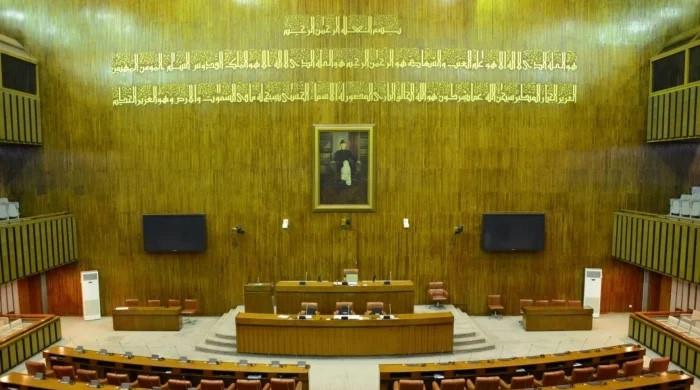Senate Approves Anti-Terrorism Amendment Bill Amid Opposition
The Senate has passed the Anti-terrorism (Amendment) Bill, 2025, amidst opposition protests. The bill was approved with a majority vote, overruling proposed modifications from Jamiat Ulema-e-Islam-Fazl (JUI-F) legislator, Kamran Murtaza.
The Minister of State for Interior and Narcotics Control, Talal Chaudhry, presented the bill to further revise the Anti-terrorism Act of 1997. The National Assembly had already sanctioned the legislation.
Murtaza introduced several changes to the bill; however, the Senate rejected these by a majority vote, and subsequently passed the bill after a detailed review of each clause.
According to the bill’s objectives, the existing security landscape necessitates a stronger response than the current legal structure provides.
These revisions seek to authorize the government, armed forces, and civil armed forces with the power to hold individuals considered a substantial threat to national security. This measure would permit the preventative detention of individuals based on reliable information or reasonable suspicion, with the goal of preempting terrorist activities.
This will also give law enforcement organizations the necessary legal support to carry out more successful counter-terrorism operations. It will enable the utilization of Joint Interrogation Teams (JTIs), which include members of various law enforcement and intelligence bodies, to undertake extensive investigations and collect useful intelligence.
In addition, the Parliament’s Upper House also passed two additional pieces of legislation: the Pakistan Land Port Authority Bill, 2025, and the Petroleum (Amendment) Bill, 2025, both unanimously approved. The Pakistan Land Port Authority Bill was introduced by the Minister of Interior, while the Petroleum (Amendment) Bill, 2025, was presented by the Minister for Petroleum, Ali Pervaiz Malik.
Earlier, Law and Justice Minister Azam Nazeer Tarar addressed concerns raised by senators, stating that the nation is grappling with a terrorism crisis and that revisions proposed by PPP’s Syed Naveed Qamar have been integrated to enhance the bill’s effectiveness.
He confirmed that the bill has undergone judicial review and includes a three-year sunset clause.
The revision aligns with the fundamental principles of the 1973 Constitution, he noted, adding that Clause 2 of the amendment mandates that detainees be presented before a judge within 24 hours.
PML-N Senator Irfan Siddiqui stressed the importance of strict measures against terrorism, saying, “We cannot allow terrorists to move freely while innocent lives are lost across provinces, on trains like the Jaffar Express, or in targeted assaults. Such acts undermine our unity and erode public trust in the state.”
Senator Siddiqui encouraged lawmakers to consider anti-terrorism legislation in its true context, stating that “we have lost nearly 100,000 lives to terrorism.”
“We must either submit to militants or enact laws to resist them. Such legislation can both prevent crime and reduce forced disappearances and arbitrary detentions,” he added.
The senator also voiced his concerns regarding political victimization and the maltreatment of political figures, recalling his own arrest and imprisonment. He expressed empathy for politicians subjected to harsh treatment.
PTI’s Barrister Syed Ali Zafar stated his party’s opposition to terrorism and desire to combat it. However, he suggested that certain clauses of the bill conflicted with the law and the Constitution, advocating for the bill to be reviewed by the committee. PTI’s Noorul Haq Qadri proposed referring the bill to the standing committee and the Council of Islamic Ideology for their feedback.
JUI-F’s Kamran Murtaza suggested that the bill be sent to the standing committee for a period of two to three days for detailed discussions.



Comments (0)
No comments yet. Be the first to comment!
Leave a Comment